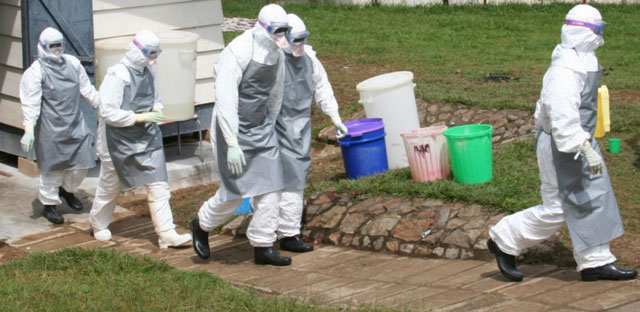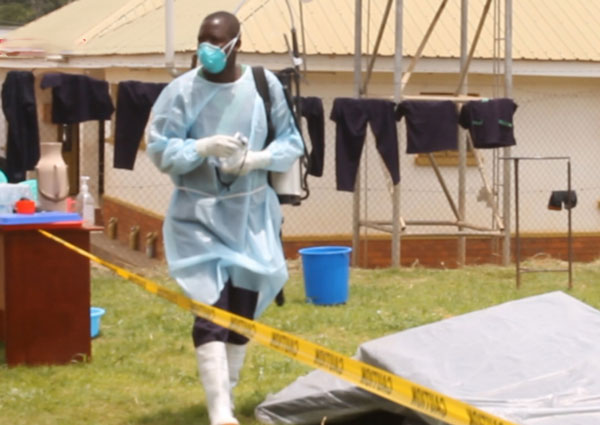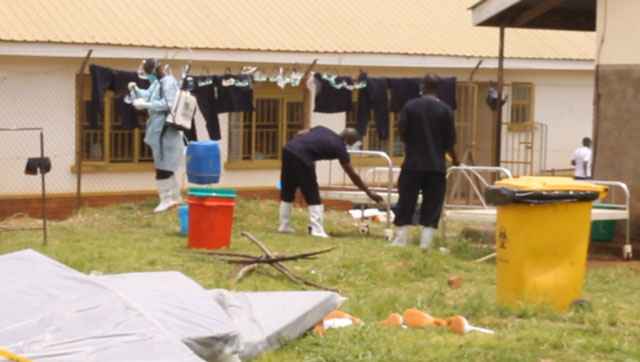
‘We’re ready’ says Uganda
COVER STORY | RONALD MUSOKE | Since Uganda declared an outbreak of Ebola hemorrhagic fever in the country on Sept.20, it has moved swiftly to achieve three main objectives; reducing its spread, minimising number of deaths, and ensuring it does not spread to neighbouring countries.
According to the Ministry of Health and officials of the World Health Organisation (WHO), to ensure positive results on all three fronts, the country is banking on its experienced pandemic fighting teams and established disease testing facilities.
Dr. Bbosa Henry Kyobe, the Ebola Incident Commander at the Ministry of Health, said Uganda was working to protect its neighbours to ensure that there are no cross-border transmissions.
He noted that the current outbreak has happened at the end of the COVID-19 pandemic. Dr. Kyobe said this will help the full management of this Ebola strain. “We are now repurposing the COVID-19 treatment centres which were previously used for COVID-19,” he said.
The World Health Organization has commended Uganda’s health authorities for being transparent while battling the latest outbreak of the Ebola Virus in the country.
“An outbreak anywhere is a threat to anyone anywhere around the world and Uganda needs support (and not isolation) in dealing with the situation,” said Dr. Patrick Otim, the Health Emergency Officer, Acute Events Management Unit, at the WHO Regional Office for Africa in Brazzaville.
Dr. Otim was speaking during a virtual media briefing on Sept.22 organized by the World Health Organisation Regional Office for Africa to update the world on the outbreak of the Ebola virus disease in Uganda.
He was joined by Dr Kyobe Henry Bbosa, the Ebola Incident Commander in Uganda’s Ministry of Health; Dr Ana Maria Henao-Restrepo, the Co-Lead Research and Development Blueprint for Epidemics, WHO Health Emergencies Programme; and Dr William A. Fischer II, the Director of Emerging Pathogens at the Institute for Global Health and Infectious Diseases and Assistant Professor of Medicine in the Division of Pulmonary and Critical Care Medicine, at the University of North Carolina in the United States.
❗ An outbreak of #Ebola virus 🦠 has been declared in 🇺🇬 after a case was confirmed in Mubende district, in the centre of the country, according to @who.
It is the first time in more than a decade that the Sudan strain has been found in Uganda.
👉 https://t.co/1pDOOUbVGQ pic.twitter.com/0XUsN6gwkc
— UN Geneva (@UNGeneva) September 24, 2022
Dr Matshidiso Moeti, the WHO Regional Director for Africa said Sept.20 that her office is working closely with Uganda’s health authorities to investigate the source of this outbreak while supporting efforts to quickly roll out effective control measures.
“Uganda is no stranger to effective Ebola control. Thanks to its expertise, action has been taken to quickly detect the virus and we can bank on this knowledge to halt the spread of infections.”
Dr. Richard Kabanda, the Commissioner in charge of Health Promotion, Education and Communication has made the same point.
“One of our greatest strengths within the region is in the area of global health security and we are drawing lessons and experiences from previous pandemics that we have controlled as a country,” he said on Sept.22. He was speaking to local broadcaster, NTV.
“We have experienced teams and that is how we were able to detect this within the shortest period of time. We have been able to deploy and reach out to all the contacts. The other capacity that we have is in terms of testing. At UVRI (Uganda Virus Research Institute), we are able to test and within a period of 12 hours, we should be able to know that one is either positive or negative.”
“Members of the public do not have to be worried because from our previous experiences, we were able to go through this by working with the public. We caution them to abide by the preventive measures that we issue from time to time. And once they do this, we should be able to fight this just like we did with the other pandemics.”
Origin of Mubende outbreak unclear
On Sept. 20, Uganda declared an outbreak of Ebola after a case of the Sudan ebolavirus strain was confirmed in the central-western Uganda district of Mubende. The Uganda Virus Research Institute (UVRI) which is based in Entebbe confirmed the case after testing a sample taken from a youthful man.

The latest outbreak is the sixth since the turn of the millennium but this particular strain is the first in a decade. Uganda last reported an outbreak of Sudan ebolavirus in 2012. However, the last Ebola outbreak was registered in 2019 following a spillover from neighbouring Democratic Republic of the Congo which at the time was battling a large epidemic of the Zaire ebolavirus in its north-eastern region.
It is still unclear how the outbreak in Mubende District happened but experts at the Ministry of Health say it is possible it came from the wild. The officials say they are yet to identify the index case for this outbreak.
“We are trying to understand the origin of the virus but this could be a fresh spill over from the wild into the human population,” said Dr. Bbosa Henry Kyobe, the Ebola Incident Commander at the Ministry of Health.
Dr. Bbosa who has also been the Incident Commander for COVID-19 at the ministry said considering that the suspected case happened around the mango season in this part of Uganda, there is a possibility of a spillover from a bat. Bats and humans eat mangoes.
According to a situation report on the outbreak which was published by the Ministry of Health on Sept.20, a 25 year old male peasant farmer-cum-retail trader from Ngabano village near Madudu Trading Centre in Mubende is the first confirmed positive case. He died of the disease on Sept.19.
He had earlier been managed for malaria at St. Florence Medical Clinic from Sept.11-13 before being referred to another health facility, St. John’s Medical Clinic, in Katwe Cell, Kyaterekera Ward in Mubende Municipality on Sept.14-15 where he was managed for Pneumonia. It was from here that the patient was eventually referred to Mubende Regional Referral Hospital for further management.
A blood sample was immediately collected and sent to the Uganda Viral Research Institute laboratory for analysis on Sept. 18. The result was reported the following day on Sept.19 with a confirmed positive result for Ebola Virus Disease (Sudan strain).
Before his death, the patient reportedly told medical personnel that he had witnessed many deaths in his village which prompted him to seek medical attention the first time he felt unwell. The first of these deaths was on Sept.1.
In the last 24 hours, Uganda has recorded four confirmed cases of Ebola, bringing the cumulative number of confirmed cases to 11, the country's health ministry reported Friday in a statement https://t.co/7fc7IqhXkt
— CNN (@CNN) September 23, 2022
One of the six deaths was managed from Ntwentwe and Bukomero in Kiboga District but buried in Mubende District. A report of clustered deaths in one family in Bulega, a village in Kakenzi Parish in Kiruma sub-county, Mubende District, is under investigation according to the Ministry of Health.
On Sept. 20, there were 11 suspected cases isolated at Mubende Regional Referral Hospital. Of these, eight including one fatality, were identified from the medical wards of the regional referral facility. The other three are referrals from Kyegegwa District which neighbours Mubende to the west.
Dr. Kyobe said the three days starting Sept.20 had presented a rapidly evolving picture, and it is impossible to give an accurate prognosis.
In fact, an update issued in the late afternoon of Sept.23 by the Ministry of Health confirmed four more cases of Ebola, bringing the cumulative number of confirmed cases to 11. There were also three more new deaths recorded, bringing the total number of cumulative deaths to 11 (including both confirmed and probable deaths). Out of these, eight deaths were from the community while the other three were health facility-based.
Ebola Virus Disease
Ebola is a severe, often fatal illness affecting humans and other primates. It has six different types, three of which (Bundibugyo, Sudan and Zaire) have previously caused large outbreaks. Case fatality rates of the Sudan virus have varied from 41% to 100% in past outbreaks.
The virus is spread by contact with bats and monkeys and also by contact with a person infected by the Ebola virus. It spreads quickly from person to person, kills in a short time but death can be prevented; especially if it is detected early and patients are put on treatment.
A person suffering from Ebola presents symptoms including; high fever (brutal and prolonged) abdominal pain, joint or body pain (especially the chest, difficulty in swallowing, headache, nauseas, vomiting (can be bloody), diarrhoea (can be bloody), dehydration (no tears, dry tongue, sunken eyes) and rash. In other cases, there can be bleeding from the mouth, eyes, nose, ears, and anus.
The Ebola virus can be transmitted by saliva and other bodily fluids such as fluids such as stool, urine, semen, vaginal secretion, runny noses as well as blood. When these fluids get in contact with broken skin, the eyes or the mouth of other people, they can get the Ebola virus.
Dr. Otim said the Ebola Sudan strain which is less transmissible than Ebola Zaire and Ebola Bundibugyo often presents with chest pain and bleeding manifestation, reddiness of eyes and vomiting of blood is also common.
Still, in both cases, he said, it is important to identify and initiate treatment as early as possible to reduce the number of deaths from the disease. “It’s very critical to treat outbreaks more seriously because we may not have the advantage to cope when the cases get out of control,” he said.
“When treatment is started early along with good supportive care, internal body organs such as kidneys which are usually the most affected can be saved,” added Dr. William A. Fischer II, the Director of Emerging Pathologies at the Institute for Global Health and Infectious Diseases and Assistant Professor of Medicine in the Division of Pulmonary and Critical Care Medicine at the University of North Carolina
In an accelerated effort to scale up response to the outbreak in Uganda, the World Health Organisation has delivered medical supplies, provided logistics and deployed staff to support Ministry of Health officials in halting the spread of the virus.
WHO has deployed a technical team to Mubende District to support surveillance, infection prevention and control and the management of cases. The UN agency is also assisting in the activation of surveillance structures in neighbouring districts and is repurposing its country-based staff to bolster the response. In addition, five international experts will be deployed, with numbers increasing if needed.
“We are acting quickly and decisively to draw the reins on this outbreak. Our experts are already on the ground working with Uganda’s experienced Ebola control teams to reinforce surveillance, diagnosis, treatment and preventive measures,” said Dr Abdou Salam Gueye, Regional Emergency Director with the WHO Regional Office for Africa.
A team of experts from the Africa Centres for Disease Control and Prevention Regional Coordinating Centre (RCC) and headquarters have also been deployed to the Uganda Ministry of Health.
The Ministry of Health has dispatched National Rapid Response Teams to Mubende, Kiboga and Mityana districts and activated the national task force as part of an immediate response to the outbreak. According to Dr. Kyobe, 11 districts including Kampala, which doubles as the administrative and commercial capital of the country, have been put on the “Red List.”

By Sept.23, contacts (people who were in touch with the infected people) had been identified as 43 and 10 people suspected to have caught the virus were receiving treatment at the regional referral hospital in Mubende.
More investigations regarding the possible sources of infection and list of contacts are going on. Preliminary investigation reports have revealed six unexplained community and health facility deaths in the same district. However, more information is needed to establish the epidemiological linkage between these deaths to the confirmed case.
Mubende District is about 150km to the west of Kampala and sits along the busy “Northern Corridor Road” leading to the Democratic Republic of the Congo. But this district also has several gold mines, which attract people from different parts of Uganda, as well as other countries. The mobile nature of the population in this district, officials say, makes the risk of a rapid spread of this disease possible.
Going forward, senior officials at the Ministry of Health say the country has the experience to manage the latest Ebola outbreak in the country.
Prof. Cesar Munoz-Fontela from the Bernhard-Nocht Institute for Tropical Medicine and member of WHO R&D Blue Print for Epidemics adds that the WHO is much more prepared than it was during the time Ebola wreaked havoc in West Africa.
#Ebola is spread through multiple ways;
1. Open wounds on the skin
2. Touching a person infected with Ebola
3. Touching sick/dead animalsRead more to know about the different ways #Ebola is spread. #EbolaOutbreakUG pic.twitter.com/PlfUOSh30h
— Ministry of Health- Uganda (@MinofHealthUG) September 21, 2022
What is #Ebola? How can you stay safe?
As complex and challenging as the Ebola virus is, collectively we shall overcome and end it.Here are some facts about the virus and tips on how to keep you and your loved ones safe.⬇ pic.twitter.com/YQlT2EjAAH
— UNICEF Uganda (@UNICEFUganda) September 22, 2022
 The Independent Uganda: You get the Truth we Pay the Price
The Independent Uganda: You get the Truth we Pay the Price



Some contacts travelled
Any strategy to enhance preventive measures for the transport sector?